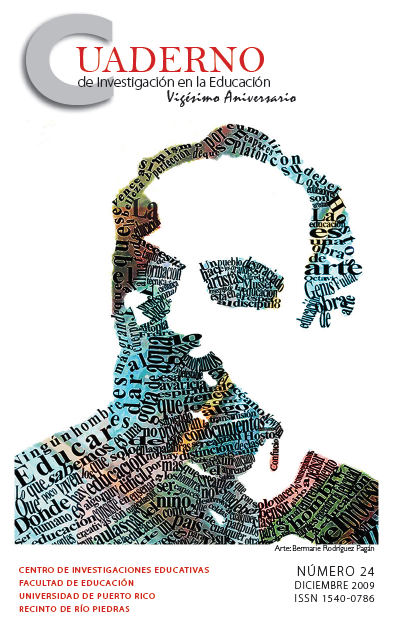Abstract
Previous studies about gender and education have studied teachers‘ roles in the classroom, and have recognized their importance in the socialization and schooling processes. This article explores and analyzes the teachers‘ interventions and roles in play areas and its relevance to children‘s gender constructions. The data was collected through ethnographic observation and were subjected to content analysis. We found a link between the recommended teachers‘ roles and less stereotyped gender constructions in Head Start children.
How to cite:
Canales-Guzmán, M. M. (2009). Construcciones de género y juego preescolar: ¿Cuáles roles asumen los educadores? Cuaderno de Investigación en la Educación, 24, 129-148. Retrieved from https://revistas.upr.edu/index.php/educacion/article/view/13552
References
Alegría I. (2000, marzo). Avatares de género y educación en Puerto Rico. Diálogo, 20-21.
Alegría, I. (2003). Ideología y política pública: la representación de las mujeres. En L.M. Martínez & M. Tamargo (eds.), Género, sociedad y cultura (pp. 160-181). Puerto Rico: Publicaciones Gaviota.
Ander-Egg, E. (1980). Introducción a las técnicas de investigación social. Madrid, España: El Cid Editor.
Berger, P. & Luckmann, T. (1967). La construcción social de la realidad. Buenos Aires: Amorrortu.
Comisión para los Asuntos de la Mujer. (1992). Hacia la equidad para las mujeres y las niñas en la educación. San Juan, Puerto Rico: Autor.
Dhingra, R., Manhas, R., & Raina, A. (2005). Play pattern in preschool setting. Journal of Human Ecology, 18 (1), 21-25.
Díaz, M.A. (2003, diciembre). Bajo el yugo de la reificación. Revista Electrónica del Instituto Psicología y Desarrollo, 3. Accedido el 17 de septiembre de 2006, desde http://www.ipside.org/dispersion/2004-3/3_ruiz.htm
Diller, A., Houston, B., Morgan, K.P. & Ayim, M. (1996). The gender question in education. Colorado: Westview Press.
Freeman, N.K., (2007). Preschooler's perceptions of gender appropriate toys and their parents' beliefs about genderized behaviors: miscommunication, mixed messages or hidden truths? Early Childhood Education Journal, 34(5), 357-366.
Griffin, G. (1999). Changes in teacher education: Looking to the future. En G. Griffin (Ed.), The education of teachers: ninety eight yearbook of the National Society for the Study of Education (pp 1-28). Chicago: NSSE.
Hernández-Sampieri, R., Fernández-Collado, C., & Baptista-Lucio, P., (2006). Metodología de la investigación. Mexico: McGraw Hill Interamericana Editores.
Hess, R. & Croft, D. (1972). Libro para educadores de niños en edad preescolar. México: Editorial Diana.
Jones, E. & Reynolds, G. (1992). The play‘s the thing: Teachers roles in children‘s play. New York: Teachers College Press.
Kirk, J. & Miller, M.L. (1986). Reliability and validity in qualitative research. California: Sage Publications.
Kontos, S. (1999). Preschool teacher's talk roles and activity settings during free play. Early Childhood Research Quarterly, 14(3), 363-382.
Lobato (s.f.). Construyendo el género: la escuela como agente coeducador. Accedido el 21 de enero de 2007 de http://web.educastur.princast.es/proyectos/coeduca/wp-content/uploads/2006/03/ConstruyendoGenero_EmmaLobato.pdf
Lucca-Irrizarry, N. & Berríos-Rivera, R. (2003). Investigación cualitativa en educación y ciencias sociales. Hato Rey, Puerto Rico: Publicaciones Puertorriqueñas.
Martínez, G. (1999). El juego y el desarrollo infantil. España: Ediciones Octaedro.
Martínez-Ramos, L. (1990). Experiencias de maestras puertorriqueñas en la integración de la equidad por género al currículo: un estudio a través de entrevistas fenomenológicas a profundidad. Disertación Doctoral sometida a la Facultad de Educación de la Universidad de Massachussets.
McMurray, P. (1993, abril). Gender experiences in an early childhood classroom through an ethnographic lens. Documento presentado en la reunion anual de la American Educational Research Association, New Orleans, LA.
Muñoz, M. (2001). Programa de educación preescolar: vías formales y no formales de educación. Manuscrito no publicado.
Rodríguez, M.d.C., Hernández, J. & Peña, J. V. (2004). Pensamiento docente sobre el juego en educación infantil: análisis desde una perspectiva de género. Revista Española de Pedagogía, 229, 455-466.
Serrano-García, I., López, M.M. & Rivera-Medina, E. (1992). Hacia una psicología social comunitaria. En I. Serrano-García y E. Rosario-Collazo (eds.), Contribuciones puertorriqueñas a la psicología social comunitaria (pp. 74-105). San Juan, Puerto Rico: Editorial de la Universidad de Puerto Rico.
Silva, G. (2004). El juego como estrategia para alcanzar la equidad cualitativa en la educación inicial: Entornos lúdicos y oportunidades de juego en el CEI y la familia. Biblioteca Virtual CLACSO. Accedido el 14 de septiembre de 2006, desde: http://bibliotecavirtual.clacso.org.ar/ar/libros/peru/grade/educa/doc4.pdf
Thorne, B. (1993). Gender play: girls and boys in school. Buckingham: Open University Press.
Yordán, H. (1976). La visión de la niña en cinco libros de lecturas escolares. San Juan: Comisión para el Mejoramiento de los Derechos de la Mujer.
The contents published in the Puerto Rico Journal of Education is freely distributed under open access practices, in accordance with the Creative Commons license, Attribution-NonCommercial 4.0 International (CC BY-NC 4.0). Through these principles, the journal and its authors allow readers to access, reproduce and share articles in full text. Users should give credit to authors in a reasonable way without suggesting they have their support. Under no circumstances, readers may make use of the contents for commercial purposes. The authors retain copyright on their works.

